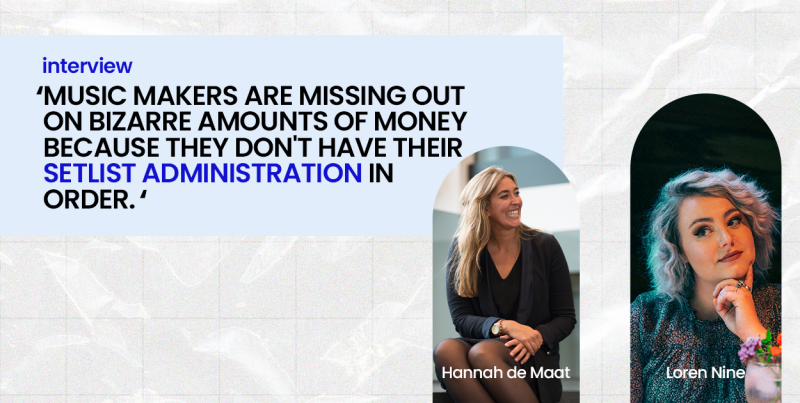Interview
11 April 2024


For some performing musicians and DJs, registering a setlist may feel like an unnecessary administrative task. But nowadays, it’s really a simple task and it yields a lot. Loren Nine, singer-songwriter, and composer, can attest to that. “I was amazed when I saw how much money came in through that simple action!
Loren Nine Geerts has been making waves as Loren Nine for quite some time. As a singer-songwriter (known for hits like the gold-certified ‘Who Needs You’), but also as a composer for various commercials, producers, and (hardcore) DJs. She has been a staunch advocate for proper setlist administration for years. “The story is actually simple. By doing this well, it creates revenue streams that benefit the entire industry.”
That quick task yields a lot of money
Loren experienced the impact of this firsthand when she performed as the opening act for Caro Emerald in England. “After each performance, tour manager Tim van der Does would come with a form for me to fill out my setlist. Honestly, I found it a bit of a hassle at first, but he emphasized its importance. It took me a while to get into the routine, but it’s actually a task of just five minutes maximum. If you play roughly the same set every night, it only takes a minute.
When the payment from BumaStemra came later, I was amazed. The whole tour was immediately covered, and I even had some left over!” In this example, it’s worth noting that it was in large venues, but Loren Nine emphasizes that it also generates good money when performing in smaller venues. “Many artists are primarily creatives. They want to create and perform, not deal with administration. Understandable, but isn’t it great that you can still better support yourself in this way? Of course, it takes time for BumaStemra to process it and for the money to come in. That’s why I advise everyone to keep a close eye on their publishers. Being creative is wonderful, but if you’re serious, you need to approach the profession a bit like a business. You’re your own CEO.
Striving for a one-to-one payout
Hannah de Maat, Manager of Licensing Events at BumaStemra, adds that BumaStemra is increasingly exploring how to efficiently facilitate a one-to-one payout. “In this specific case, we utilize web crawlers that map out all venues where live music is performed, ranging from festivals and concert halls to carnival parades. Playlists and setlists are crucial because they allow us to track each song individually and determine which members have contributed to them, thus enabling us to distribute income with greater accuracy. We aim to collaborate with channels that work best for performing artists who need to submit their setlists. At many dance festivals, we now employ ‘fingerprinting’ technology, automating the process. For live artists, we offer an app that makes filling out and submitting setlists extremely user-friendly, and we recently launched a new MBS [MijnBumaStemra, ed.] portal. By minimizing barriers, we aim to optimize income for authors.”
Awareness
“And that’s really crucial,” adds Loren Nine. “I mentioned my own performances earlier, but the majority of my work is performed or played by others, such as in DJ sets. There are many songwriters like me whose work is performed or played by others. That also means that we as a professional group are heavily reliant on how those performing artists handle their administration. Especially because I’m also active as a performing artist, I’ve experienced how easy it is and what it can yield. That’s why I emphasize it so much. It’s often a lack of awareness. I hear things like ‘Doesn’t the venue provide the setlist?’ To which I respond, ‘How would the venue know what you’re playing?’ You also see in the DJ world that there isn’t always an awareness that there are people who create the work they play. Musicians are missing out on bizarre amounts of money because they don’t have their setlist administration in order. That’s incredibly wasteful. Especially in a world where there’s increasing collaboration with different authors per track and various distribution models, as a performing artist, you’re also responsible for the income of those people. Fortunately, awareness of this is growing, and it’s really easy to do. Make sure that setlist is in order after every gig; it benefits everyone involved!”

